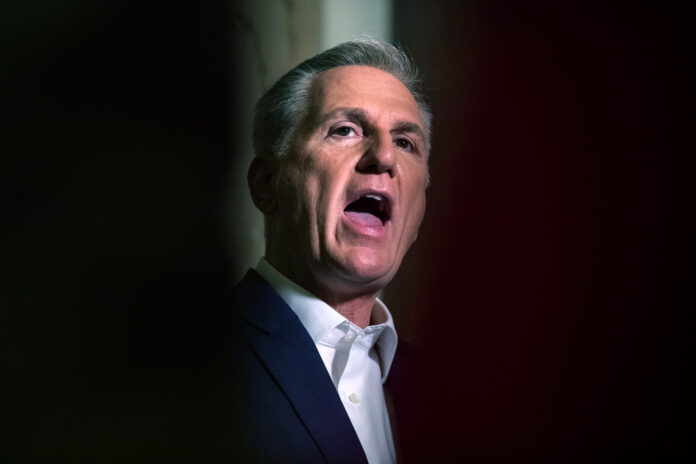House Speaker Kevin McCarthy’s plan to raise the federal debt ceiling may need Democratic support to pass a key committee.
McCarthy, a California Republican, and President Joe Biden announced a tentative deal over the weekend to raise the $31.5 trillion debt limit for two years while also cutting federal spending. They announced the deal just days before the United States is set to default on its commitments—which experts say would have devastating impacts to the global economy, giving Congress roughly one week to get the bill to Biden’s desk.
Before the bill can be brought to a vote on the floor of the House, it must pass the Rules Committee, a 13-member panel that sets the rules of debate and amendments for legislation. The bill is divided between nine Republicans and four Democrats, meaning McCarthy can lose only two of his own party’s votes without relying on his colleagues from the left. The committee has historically been stacked with loyalists to past speakers, but House conservatives demanded more right-leaning members be placed on the committee in exchange for votes to give McCarthy the speakership.
Already, two of the Republican members on the committee have signaled opposition to the bill. Conservatives have said McCarthy did not secure enough spending cuts and that it would be fiscally irresponsible to raise the limit by roughly $4 trillion without more reductions to federal spending. The committee is set to meet on the bill on Tuesday at 3 p.m. ET.
Anna Rose Layden/Getty Images
Representative Ralph Norman of South Carolina has been one of the most vocal GOP critics of the agreement. In a tweet, he wrote that he would not vote to “bankrupt” the U.S.
“This ‘deal’ is insanity. A $4T debt ceiling increase with virtually no cuts is not what we agreed to. Not gonna vote to bankrupt our country. The American people deserve better,” the congressman tweeted on Saturday.
This “deal” is insanity.
A $4T debt ceiling increase with virtually no cuts is not what we agreed to.
Not gonna vote to bankrupt our country. The American people deserve better.
— Rep. Ralph Norman (@RepRalphNorman) May 28, 2023
Meanwhile, Representative Chip Roy of Texas has also voiced opposition to the bill, tweeting, “+ $4 trillion. No.”
This leaves Representative Thomas Massie of Kentucky, a fiscal conservative who has been willing to buck his party in past votes, as the key swing vote among Republicans. Massie remains undecided on the vote, telling The Washington Post on Sunday that he needs time to read the bill before deciding whether he will vote on it.
Newsweek reached out to McCarthy’s office for comment via email.
If Massie ultimately decides to oppose the legislation, the agreement would require support of the committee’s four Democrats to make it to the House floor, when it will likely need some degree of bipartisan support to pass, as at least eight Republicans have either said they would vote against the bill or have been highly critical of it.
Where Democrats Stand on Debt Ceiling Bill
Progressive Democrats have taken issue with some of the spending cuts in the bill, which will cap spending in the 2024 and 2025 budgets, repeal unused COVID-19 relief funds, cut Internal Revenue Service (IRS) funding and add work requirements for food aid programs, CNN reported.
Representative Pramila Jayapal of Washington state, who chairs the Congressional Progressive Caucus, said the 100-member caucus may not vote for the bill during an appearance on CNN Sunday morning, pointing to issues with the new work requirements.
Notably, all four Democrats serving on the Rules Committee—Representatives James McGovern, Mary Gay Scanlon, Joe Neguse and Teresa Leger Fernandez—are members of the progressive caucus.
Meanwhile, Representative Annie Kuster of New Hampshire, who chairs the center-left New Democrat Coalition, said in a statement on the coalition’s website that her caucus’ members are “encouraged” by the agreement.
“We want to be clear––our Members are committed to upholding the full faith and credit of the United States. We must act responsibly to ensure that we prevent the catastrophic consequences of default and protect the needs of the most vulnerable in our society,” she said Sunday.


